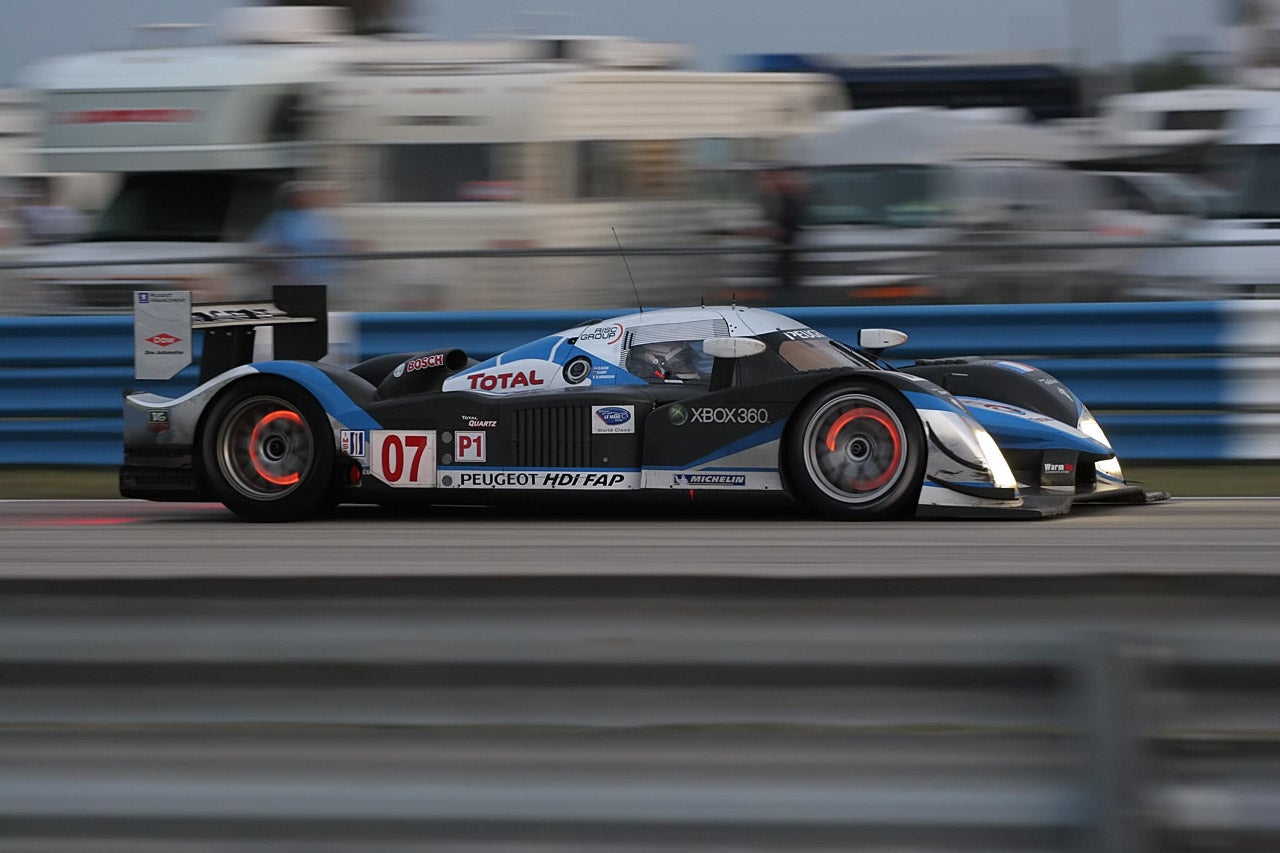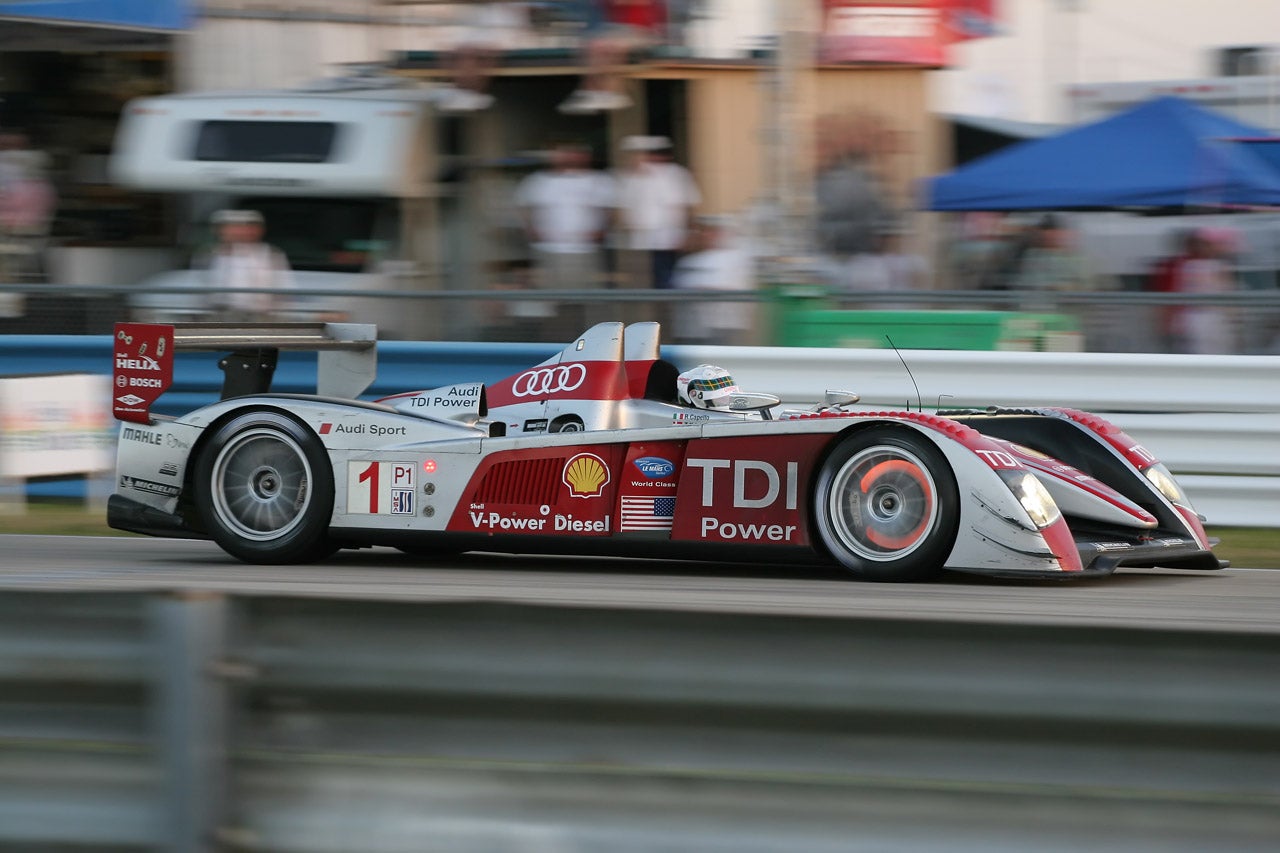 "dieseldub" (dieseldub)
"dieseldub" (dieseldub)
09/22/2020 at 22:51 • Filed to: None
 12
12
 5
5
 "dieseldub" (dieseldub)
"dieseldub" (dieseldub)
09/22/2020 at 22:51 • Filed to: None |  12 12
|  5 5 |
The late 2000s were a fascinating time for Le Mans racing. We still had the GT1 (nee GTS ) class where brutal 600 hp, production-based monsters like the 7L Corvette thumping everyone’s chest going around the track, V12 Aston Martins always nearby in close competition and for a time, Saleen S7s, also with a 7L Ford-based V8. One season wonders with the Maserati MC12 in 2005 and even a Lambo Murcielago R-GT in 2004 (still has my vote for most insane audible assault by a vehicle ever).
In the lesser production based GT2 class (former GT) there were Porsche flat 6s going up against flat plane crank Ferrari V8s, BMW straight 6s, Spyker C8s with Audi V8s, there even was a Morgan Aero 8 at one point in time among other fascinating cars.
But the top class (LMP1 prototype class) was turned on its head in 2006 when Audi showed up with a V12 twin turbo diesel. Peugeo t followed suit a year later with their own V12 diesel prototype.
At the time, there was a strange new rule regulating open top vs. closed top prototypes as well. The slipperier closed top cars were allowed to have higher power because they were also required to have some kind of air conditioning for the driver and to enforce the rule, they were required to have a cockpit temperature sensor and were given a regulation that the cabin temperature could not exceed a certain amount. So, presumably, some of the extra power the coupes were allowed were going to be taken by whatever cooling system they managed to barely squeak past the rules.
Audi went open top, Peugeot went closed top. Peugeot had a power advantage that became very apparent by 2008. But, Audi would still end up with a Le Mans win thanks to better reliability, car design with some nod towards quick serviceability and an entire army of well-drilled mechanics who would swarm a car in the garage should it have an issue during the race and effect repairs very rapidly. In an endurance race, this often proves to be more important than outright speed, as proved by the results in 2008.
But, I’m bringing this up because Marshall Pruett over at Racer did an interview recently with 3 of the former Peugeot drivers from that era, one a former IndyCar driver, one a former F1 driver, the last one did both F1 and IndyCar/ChampCar (Sebastian Bourdais) and won multiple ChampCar titles.
During this interview, the drivers describe what it was like to drive these absolute monster French diesels.
!!! UNKNOWN CONTENT TYPE !!!
Racer has split up the interviews onto 5 different pages, though at the bottom of each interview is the audio recording of the interviews.
A little more background. The top prototype class for a number of years had a target horsepower of around 600. There are wildly varying different kinds of engines that compete in the class, so the sanctioning body (ACO) issues different sized air restrictors for each kind of engine to try and reach some kind of parity and keep overall power levels in check near that 600 mark.
Then along come the diesels, which were a bit of an unknown. Audi’s first one in 2006 was supposedly rated at 650 hp and a scarcely believable 830 ft-lbs of torque... Redline was somewhere near 6000 RPM, but they usually shifted closer to 5000, typical of a diesel that runs out of steam as you get to those higher reaches of the rev range.
The Peugeot guys described it as this (though I think the rev count is a little low as described):
!!! UNKNOWN CONTENT TYPE !!!
The Peugeot may have had closer to 700 peak horsepower (likely somewhere above 4000 RPM), but running the calculation of that peak torque number at 3000 RPM, that means even at 3000 RPM the engine is making 527 hp... It’s the “area below the curve” that really makes these things move out in a hurry off corners.

Without me regurgitating too much, I’ll link the various articles here for your own reading or listening.
!!! UNKNOWN CONTENT TYPE !!!
!!! UNKNOWN CONTENT TYPE !!!
Here they briefly describe that these diesel race cars were actually fitted with particulate filters because the rules stated they could not emit visible emissions on track. This was also agreeable to the manufacturers who were still developing that technology for road cars. Except they still had some dialing in to do in those early days, as the excerpt linked below tells the story.
!!! UNKNOWN CONTENT TYPE !!!
Here they describe the torque delivery and how sometimes upshifting actually netted you MORE acceleration, despite the decrease in torque multiplication to the wheels from gearing, because it put the engine back into where it’s making the meat of its torque output, which should be a familiar feeling to anyone who’s driven a Euro “high speed diesel” in the last couple decades. It also broke a lot of stuff... like transmissions... And Audi already had a rules change happen with their dominant R8 gas direct injected prototype in the early aughts because they would change the whole rear assembly of the car, the transaxle with the entire rear suspension and body work bolted to it, in under 4 minutes...
So, the ACO changed the rule that the transmission case could not be changed, but you could repair the gearbox internals... Since this is an interview with Peugeot drivers, it doesn’t cover how Audi brilliantly adjusted to that rules change when they came out with the diesel prototypes by 2006; they designed the transmission so the entire gear stack could be swapped in about 10 minutes.
!!! UNKNOWN CONTENT TYPE !!!
Here the drivers discuss the original 908's replacement, with a downsized V8 turbo diesel, except now Audi had also changed up their strategy and made a coupe like Peugeot to be on more even footing... Here the drivers also go on about how wicked handling this revised 908 was initially.
!!! UNKNOWN CONTENT TYPE !!!
I’ll leave you with one last photo of mine and a snippet from memory on what it was like to witness these things in person:

I attended the 12 Hours of Sebring from 2004-2009, and once more in 2011. I also went to races at Mid Ohio (2004-9) , Road America (2004-9) and Road Atlanta (only once in 2004) in that time frame for ALMS events.
These races had a mad mish-mash of different engine sounds. The diesels were very different, though. The combination of low revs, being turbocharged AND being equipped with particulate filters meant you usually didn’t even hear the engine as the cars approached. You’d hear air over the body work, you’d hear the tires hitting ripples on the pavement, but you wouldn’t hear the engine until the thing was going past you and the exhaust outlets were facing you. And then it just sounds like a low, smooth tone with some wooshing of turbos mixed in.
Standing at some blind, slow corners like Sebring’s turn 5 to get photos was challenging if you were specifically trying to get a shot of the diesels. They’d just suddenly appear in front of you with no audible warning. You’d hear the 7L Corvette blatting behind it several corners away, but the damn diesels were just sneaky quiet.
That first year at Sebring for the Audis in 2006 was really nuts for fans, you could tell. It was unlike anything else they had ever seen or heard. I can remember watching many heads alongside the fence at the hairpin shaking in disbelief as they watched this eerily quiet, smoke-free diesel-powered car running away with the race. It was fantastic to be there in person, watching that car’s first ever race and witnessing a paradigm shift first hand.
Just too bad VW/Audi had to go fuck it up by cheating emissions with their production car diesels.
These race cars were absolute monsters, and to hear F1 drivers being gob-smacked by driving one of these cars is pretty great.
 phenotyp
> dieseldub
phenotyp
> dieseldub
09/23/2020 at 00:04 |
|
This is great. Thank you!
 RacinBob
> dieseldub
RacinBob
> dieseldub
09/23/2020 at 00:13 |
|
My thoughts exactly
 For Sweden
> dieseldub
For Sweden
> dieseldub
09/23/2020 at 00:47 |
|
Back when French cars competed at Le Mans and the world made sense.
 Jb boin
> For Sweden
Jb boin
> For Sweden
09/23/2020 at 04:39 |
|
There are still many but just not in LMP1.
 Darkbrador
> dieseldub
Darkbrador
> dieseldub
09/23/2020 at 09:59 |
|
Something something “ horsepower sells cars, torque wins races” something ...
Good article !